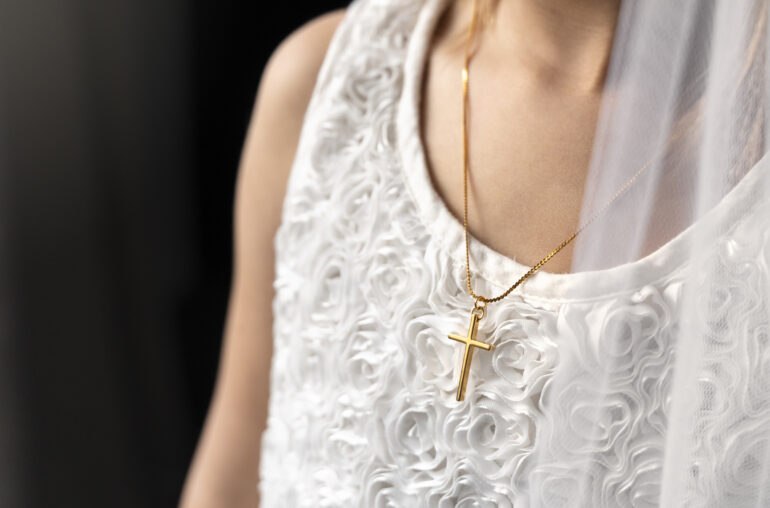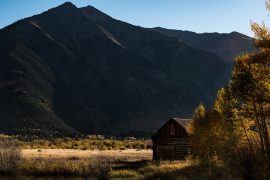Laura K. Bray
I was six years old when I was buried alive. They say when they pulled me from the earth, the gold cross necklace Mama gave me was embedded in the skin of my chest. The mark stayed on my chest through all the days of my bedrest and recovery, reminding me it was only through Jesus’ love that I survived and I damn well better spend the rest of my life being a good girl in return for the favor.
I had begged to play on the cliffs with my older siblings. I whined and cajoled, “Please, Mama, tell them to let me come.”
I knew my mother, sitting on the beach blanket that hot June day in 1935, wouldn’t say no. She was distracted by my younger siblings as they toddled around her, squatting at the water’s edge as babies do; soggy diapered, beach buckets in hand. She was eager to put my older sister in charge of me. I could tell because the dark circles under her eyes were so dark they looked like bruises.
Daddy was nowhere to be found. More than likely, he was at the pier, talking to the fishermen lined up along the rails, begging for a cold beer from their fishy-smelling coolers. When we came home, he would sit in his armchair, smoking hand-rolled cigarettes, slurring his words.
Eventually he would fall asleep, and I would crawl into his lap and inhale the smell of his sweat, his breath laced with beer and cigarettes. It was the only time I was allowed to be close to him. I would spend the rest of my days chasing after the smell of my father, haunting bars, sitting in the laps of drunks, searching their faces for kindness.
My mother called my sister over. Ruthie was eleven and my second mother. “Take Betty with you,” Mama snapped.
Ruthie sighed, grabbed my hand, and yanked me toward her, her eyes on our brothers who were racing ahead. I tripped as she dragged me along, and the hot sand scraped the top of my feet, working its way between my foot and sandal, rubbing the skin raw.
The boys complained about me coming along, but that didn’t stop me. I would climb the cliffs faster than any of them. I would show them I could keep up. I wasn’t a baby! I marched toward my fate with determination and anger.
My brothers ran ahead, eager to show off. They were in the golden days of boyhood, years away from becoming men, but already showing signs that they would follow in my father’s footsteps, stealing smokes and sips of beer whenever my father wasn’t looking or was too drunk to care.
My mother ignored these early warning signs. She was so in love with those boys, unaware that her drunk, abusive husband was teaching them how to treat women. She was teaching her daughters what to expect from the men they loved.
Mama wouldn’t admit it, but deep down in her soul, she wanted my brothers to grow up tough. She longed for them to stand up to Daddy and make him pay for what he was doing to all of us. Frankie’s arm had already been broken when he put himself between my drunk and enraged father and our cowering mother. Sorry as she was for the injury, Mama couldn’t help but feel proud that her boy had tried to save her.
When we would squabble amongst each other, Mama would always tell us that blood was thicker than water. No matter what the world threw at you, you could always depend on family and sometimes that meant protecting each other from one another.
We were discouraged from having friends outside of our siblings and cousins. Even spouses were held at arm’s length. Our mother, whose blood ran through our veins, believed her relationship with us was more important than the one she had with her husband, our father. He was an interloper, an outsider. She was only related to him on paper. He was water. We were blood. The day Frankie took the hit that was meant for her and got his arm broke proved this.
My brothers climbed the cliff ahead of me. I wondered if they would protect me, too, or would they end up like Daddy? How could I believe Mama’s theory when Daddy was my blood and still hit me? Mama always said my brothers and sister would watch over me, but they had left me at the bottom of the cliff, alone and afraid. Even Ruthie, my second mother, forgot about me in the excitement of conquering the cliff.
My siblings were halfway up the cliff, clinging from rocks and roots by the time I reached the base. I put my hands on the first rock and strained to pull myself up, my legs kicking behind me as I tried to find a foothold. Dirt and sand rained down on me as my brothers and Ruthie worked their way up. Tears left trails down my dirty cheeks.
I heard a deep rumble and felt the earth shift beneath me. Suddenly, my siblings were screaming, tumbling by me as the cliff let go. Everything went black.
They say the reason I make bad decisions and struggle in this world is because I spent too long on the other side, buried alive. My body and brain cried out for oxygen; the weight of the earth pushed down on my slight chest.
When the cliff let go, my mother told me the beachgoers ran towards us and started digging furiously. She dug until her fingers were bloody, screaming for help.
They found my brothers first, then my sister. The crowd slowed their digging, believing they had unearthed all the buried children. My brothers began yelling, telling the crowd their sister was still buried. My mother continued digging, almost in a trance.
“Don’t worry, boys, your sister’s right here,” the rescuers said, pointing to Ruthie.
My brothers wouldn’t stop hollering. Eventually, the beachgoers realized they meant another sister. The digging became frenzied. Mine was the only body pulled limp and lifeless from the earth.
My mother brushed the dirt from my eyes, her finger scooped the sand from my mouth. I took a deep breath and opened my eyes. My brother cheered. Ruthie cried in relief. I was saved. My siblings hadn’t let the rescuers give up on me. Maybe Mama was right, maybe I could always depend on my kin.
Years went by and, as expected, my brothers went on to drink too much and treat their women poorly. They revered Mama until her last breath and if any of their wives or girlfriends dared to question Mama, they would likely be put to the curb like trash.
As for me, I went through a string of bad marriages. At each wedding I wore the gold cross that had been embedded into the skin over my heart. In every marriage I felt buried alive, deprived of oxygen, and I waited for help from Jesus, Daddy, my brothers, my mother. It never came.
In a rush of blood and water, I gave birth. It was a girl. As she wrapped her small fist around my finger, I took her little hand and led her deep into the same whirlpool of contradiction that I continued to drown in. “Blood is thicker than water,” I whispered into her tiny ear.
It is a belief that can build bonds. It can also bury you. On her wedding day, I’ll give her the gold cross I wore on the day of the landslide, branding me to this family. She’ll wear it and one day she’ll tell her children, “Blood is thicker than water.” It is our covenant, her birthright.
When Laura K. Bray was a little girl, she wanted to drive a Trans Am and be a hairdresser. As an adult, she drives a Subaru and writes stories. Laura lives in the Pacific Northwest with her husband. She writes memoir essays about being a feral, GenX child and fictional short stories. You can find her on Substack at laurakbray.substack.com.



